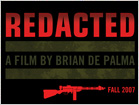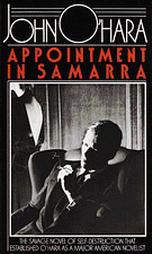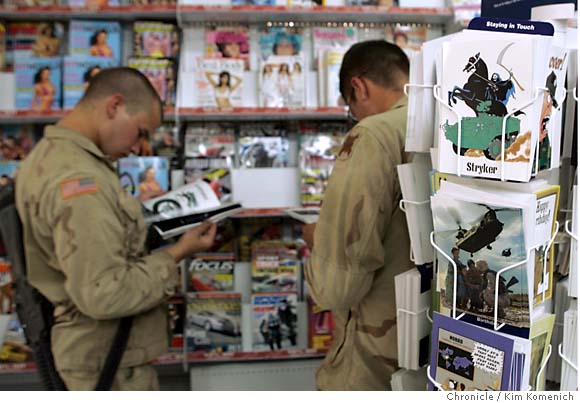a la MOD

| Brought to you by |
|---|
| GEOFF SONGS |
|
|
| Discuss De Palma & cinema |
| 24 Lies A Second forum |
| Return to |
| Home Page |
| News Page #2, #3 |
|
a la MOD  |
|---|
Updated March 28 2007 - Updated March 27 2007 - Posted March 26 2007 APPOINTMENT IN SAMARRA APPOINTMENT IN SAMARRASOME NOTES ON THE REDACTED SCREENPLAY  I have seen parts of the screenplay Brian De Palma has written for Redacted, which starts filming in Toronto and Jordan next month, and it has me very excited about this new project. The screenplay bits that I have seen are brilliant, playing like a postmodern doppelganger remake of De Palma's Casualties Of War. Where the latter film has a more traditional narrative approach, the new film promises to keep a similar story pattern, but with the added touch of using modern media techniques to tell the story. Think of De Palma's ideas for Hi, Mom!, which was inspired greatly by Jim McBride's David Holzman's Diary. In Hi, Mom!, various ways of seeing through lenses created a montage of stories circling around each other. That's what Redacted looks to be, as well. It is a work of fiction based on things that really happened during the past few years in Iraq, the center of which is the gang-rape and murder of a 14-year-old Iraqi girl, which happened after her parents and sister were murdered in another room of the house. While that incident took place in Al-Mahmudiyah, De Palma has set his story in Samarra. An early scene, shot from the camera of a soldier named Diaz, shows another soldier (Norm) reading a copy of John O'Hara's Appointment In Samarra, and getting a little irritated that the book is not about Samarra at all. "That's what I get for thinking I could tell a book by its cover," he says. Diaz, who is an aspiring filmmaker documenting his time in Iraq, asks, "So when's the appointment?" Norm then begins to read the W. Somerset Maugham fable that prefaces the book-- a book that happens to be one of De Palma's favorites. I have seen parts of the screenplay Brian De Palma has written for Redacted, which starts filming in Toronto and Jordan next month, and it has me very excited about this new project. The screenplay bits that I have seen are brilliant, playing like a postmodern doppelganger remake of De Palma's Casualties Of War. Where the latter film has a more traditional narrative approach, the new film promises to keep a similar story pattern, but with the added touch of using modern media techniques to tell the story. Think of De Palma's ideas for Hi, Mom!, which was inspired greatly by Jim McBride's David Holzman's Diary. In Hi, Mom!, various ways of seeing through lenses created a montage of stories circling around each other. That's what Redacted looks to be, as well. It is a work of fiction based on things that really happened during the past few years in Iraq, the center of which is the gang-rape and murder of a 14-year-old Iraqi girl, which happened after her parents and sister were murdered in another room of the house. While that incident took place in Al-Mahmudiyah, De Palma has set his story in Samarra. An early scene, shot from the camera of a soldier named Diaz, shows another soldier (Norm) reading a copy of John O'Hara's Appointment In Samarra, and getting a little irritated that the book is not about Samarra at all. "That's what I get for thinking I could tell a book by its cover," he says. Diaz, who is an aspiring filmmaker documenting his time in Iraq, asks, "So when's the appointment?" Norm then begins to read the W. Somerset Maugham fable that prefaces the book-- a book that happens to be one of De Palma's favorites.In her 10th-anniversary edition of The Devil's Candy, Julie Salamon, a longtime friend of De Palma's, states that De Palma often quotes from the O'Hara book, which deals with self-destructive behavior and the inevitability of fate. (Maugham is also one of De Palma's favorite authors.) The Maugham bit that prefaces O'Hara's novel is an appropriation/retelling of an old Arabic tale which Maugham uses to end his play, Sheppey. Here it is as presented in the O'Hara book: DEATH SPEAKS: There was a merchant in Bagdad who sent his servant to market to buy provisions and in a little while the servant came back, white and trembling, and said, Master, just now when I was in the market-place I was jostled by a woman in the crowd and when I turned I saw it was Death that jostled me. She looked at me and made a threatening gesture; now, lend me your horse, and I will ride away from this city and avoid my fate. I will go to Samarra and there Death will not find me. The merchant lent him his horse, and the servant mounted it, and he dug his spurs in its flanks and as fast as the horse could gallop he went. Then the merchant went down to the market-place and he saw me standing in the crowd and he came to me and said, Why did you make a threatening gesture to my servant when you saw him this morning? That was not a threatening gesture, I said, it was only a start of surprise. I was astonished to see him in Bagdad, for I had an appointment with him tonight in Samarra. -W. Somerset Maugham In De Palma's screenplay, Diaz cuts Norm off before he gets to the end, telling him to cut to the chase. (The photo below is taken from an Iraq/Samarra journal at SFGate.com. The caption reads: A Grim Reaper rides a tank on a greeting card in the "Staying in Touch" section of the Camp Victory PX greeting card department. Chronicle photo by Kim Komenich.)  Other bits from the Redacted screenplay (with only very minor spoilers): there is a scene near the beginning where Diaz and the film's major conscience character (Barton, the whistleblower) are filming each other and commenting on it at the same time. They make a deal that whichever one survives inherits all the videos of the one who doesn't. Diaz says, "I'm just telling it like it is. War is hell. But the truth. Is coming through this lens. 24 times a second." Barton then makes a comment about the "cliche" that truth is the first casualty of war. After Barton leaves, Diaz turns the camera back on himself and rants on about how boring it is where his squad is stationed. "So don't be expecting any Hollywood action flick -- no smash cuts, no adrenaline-pumping soundtracks, no logical narratives that help make sense of it. Basically, here, shit happens." [Here, the SPOILERS will get a little deeper, but I won't go into too much detail.] The film's characters are witness to a fellow soldier's death by Improvised Explosive Device (IED), which turns some more bitter than others. Later on, Diaz is recording during a poker game where one of the soldiers tells him to turn off the camera, so he can talk off the record-- Diaz says okay, but sets his camera down with the tape still running, and De Palma doesn't fully describe the way we are going to see the ensuing conversation, but we can guess that the canted visual will throw things a bit off-kilter in intriguing ways. The camera stays like this as the conversation wraps up and they end a round of poker. There is an I-Chat between a soldier and his father that is presented in split-screen. There is a web diary done by the wife of one of the major characters. After the incident in Samarra is made public, we see a ranting backlash reaction posted on YouTube. There are video depositions that play like echoes of the depositions at the end of De Palma's Casualties Of War. There is a harrowing beheading posted on the internet that directly affects the main characters. References to September 11 abound. Because much of what will be presented are videos shot by various characters, there is a lot of talking/looking directly into the camera, making the war seem as immediate as today's news. With this script, De Palma has found a way to tie all of these elements together into a wrenching drama, while at the same time investigating the recent explosions of various media and technology. I imagine there will be a certain amount of improvisation during filming, which will only add to the overall immediacy effect... |